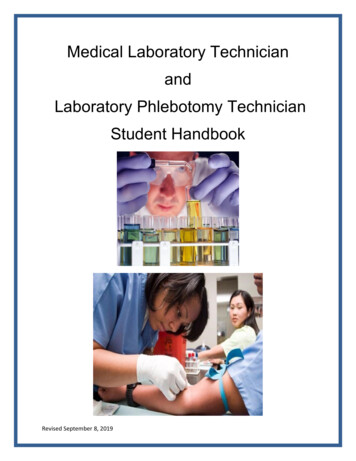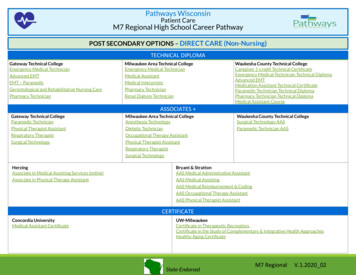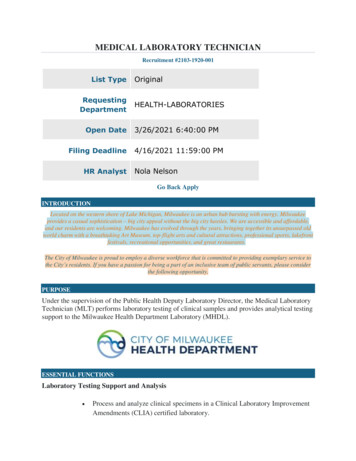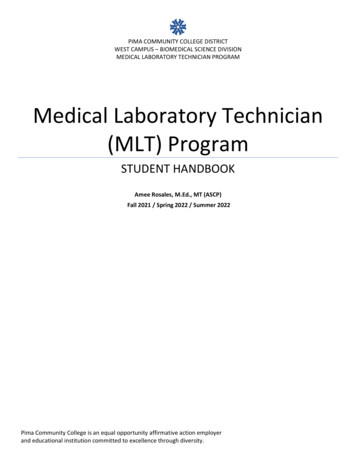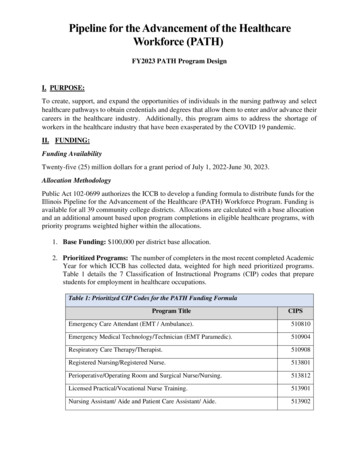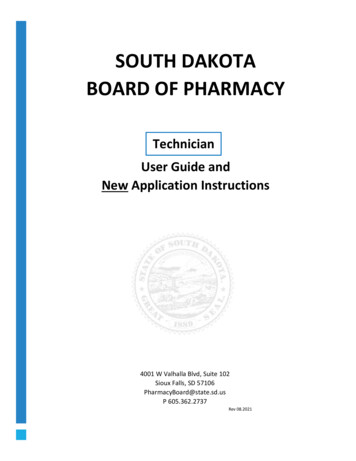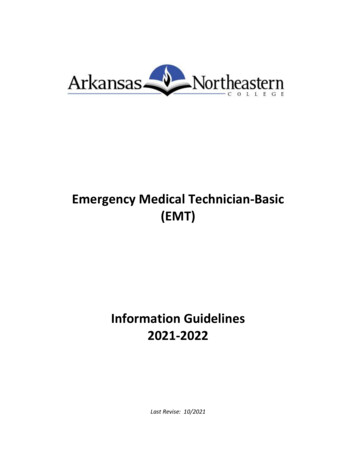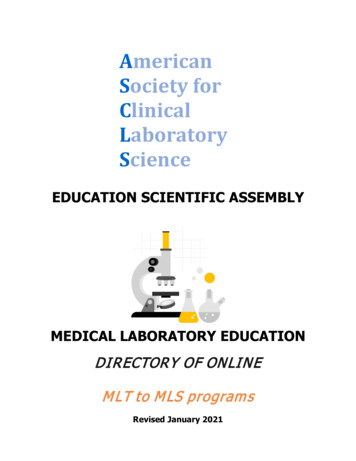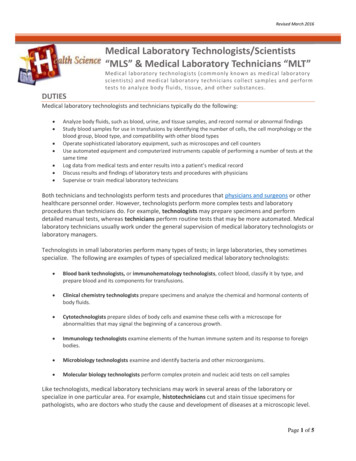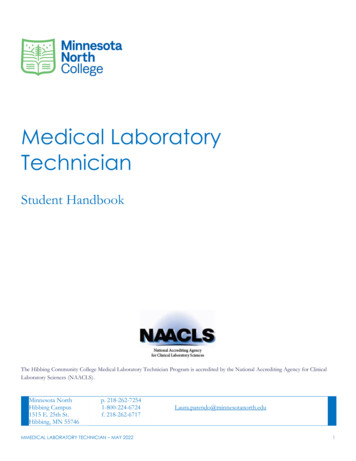
Transcription
Medical LaboratoryTechnicianStudent HandbookThe Hibbing Community College Medical Laboratory Technician Program is accredited by the National Accrediting Agency for ClinicalLaboratory Sciences (NAACLS).Minnesota NorthHibbing Campus1515 E. 25th St.Hibbing, MN 55746p. 218-262-72541-800-224-6724f. 218-262-6717MMEDICAL LABORATORY TECHNICIAN – MAY 2022Laura.parendo@minnesotanorth.edu1
Table of ContentsI. Welcome!! .4Professional DescriptionCode of EthicsProgram DescriptionLaboratory Technician CareerMission StatementMLT Program GoalsMLT Program CompetenciesKeys to SuccessTechnical StandardsII. Accreditation Standards.7III. Program Requirements 8Background StudyImmunizationsDrug ScreensIV.Program Description and Course Requirements .9Program DescriptionAdmission CriteriaPersonal RequirementsCode of ConductProgram ProgressionCourse Sequence and GradesAcademic EvaluationSatisfactory Academic Progress PolicyAffective EvaluationsPromptness and AttendanceEffective LearningAcademic IntegrityClinical Placement PolicyTable of Clinical Affiliate SitesExpectations of Students Attending Clinical Practicums Arranged Through HCCInternship Behavior ExpectationsAttendance at Clinical InternshipsService Work PolicyInappropriate Behavior PolicyExpectations of Preceptors Responsible for Teaching HCC StudentsState LicensureMMEDICAL LABORATORY TECHNICIAN – MAY 20222
V. Student Information .18Academic GrievancesStudent Academic PetitionsClaims by a Student Alleging Improper, Unfair, Arbitrary or Discriminatory TreatmentWithdrawal from the ProgramStudent HealthCommunicationMLT Teach-out PolicyMLT Temporary Emergency PolicyVI. Tuition and Fees . 19Appendix A: On Campus Program Plan .21Appendix B: Online Program Plan .22Appendix C: Statement of Support.23Appendix D: Clinical Facility Fact Sheet.26Appendix E: Didactic Faculty Fact Sheet.28Appendix F: MLT Immunization Sheet.29Appendix G: Hepatitis Signature Form.30Appendix H: Student HIPAA and Safety Signature Page.31Student Signature Page.32MMEDICAL LABORATORY TECHNICIAN – MAY 20223
I.Welcome!!Welcome to Minnesota North Hibbing Campus Medical Laboratory Technician Program! Being accepted in to the MLTprogram comes with it many opportunities, hard work, vigilance, and character. We emphasize patient care above all else,problem solving, critical thinking, and ethics. The role of the MLT is both rewarding and challenging. It requires professionaljudgment as medicine often does not fall into absolutes. The profession requires independent thinking, interpretation, and adrive for continuous learning. This handbook has been prepared to help you learn and understand the responsibilities andexpectations that will apply directly to you as an MLT student.During your first semesters you can be expected to be challenged well beyond your personal expectations. Your timecommitment and commitment to learning is essential and cannot be underestimated. The expectations of the MLT faculty ishigh as it is our role to prepare you to sit for your ASCP Board of Registry upon completion of the program. During yourinitial phases of the program, we as faculty, encourage you to get to know your classmates. These people will be yourassociates and colleagues. As a member of the class, it is your responsibility to work together. You will need to accept theattitudes and ideas of class members that may be very different from your own. Without this harmony, the goals of the classand the MLT program cannot be attained. It is the expectations that students will demonstrate the ability to discuss,demonstrate, and debate in a proper, respectful manner. It is also expected that students will be good listeners. Listen withthe intent to learn.Professional DescriptionThe Medical Laboratory Technician is a health professional qualified by academics and skills training to provide quality servicein the field of clinical laboratory science.Code of Ethics:The American Society for Clinical Laboratory Science (ASCLS) is an organization representing the lab profession. Thisorganization has put together a Code of Ethics setting “forth principles and standards by which clinical laboratoryprofessionals practice their profession.” In doing so ASCLS has set guiding principles that include: Duty to the Patient Duty to Colleagues and the Profession Duty to SocietyPlease visit www.ascls.org for more information.Program DescriptionMedical Laboratory Technician is a profession combining the challenges and rewards of both medicine and science. AMedical Laboratory Technician performs laboratory testing to include visual, chemical, and microscopic examinations ofblood, body fluids, and tissues to aid in diagnosis, treatment, and monitoring of disease. On campus student will completetwo years of studies to include a clinical practicum during their last semester. On line students will complete the sameprogram in a three-year program designed for working part-time students. Students will learn theory and principles behind thetesting performed. In addition, students learn to think critically, correlating patient results with disease states.Laboratory Technician CareerThe need for Medical Laboratory Technicians is growing faster than there are qualified people to fill these jobs. Currently,positions are open for qualified laboratory professionals at places such as hospitals, clinics, public health facilities, business,and industry. The employment outlook promises to continue to be strong, as there is a shortage of Medical LaboratoryTechnicians nationwide. Because the Laboratory Technician Career often involves life and death scenarios and situations, it isMMEDICAL LABORATORY TECHNICIAN – MAY 20224
imperative that students recognize the level of responsibility they carry entering the workforce. The career is challenging andrewarding and therefore includes certain academic rigors and legal aspects to be met in order to complete the program. Inorder to be successful students must be prepared to dedicate their time to build on the professional development skills. Inorder to be successful in the MLT program and in the career of Medical Laboratory Technician, you must: Hold a valid driver’s license or have transportation to your internship site Have a clear criminal history* Have completed and documented the required immunizations (on campus students) Have the ability to think critically with strong problem-solving skills Have good time management Be self-motivated Possess proper communication skills both written and verbal Possess the ability to perform the essential job functions of a Medical Laboratory Technician.Mission StatementMinnesota North Hibbing Campus Medical Laboratory Technician program is a NAACLS accredited programcommitted to improving the quality of care as an integral member of the health care team. With the collaboration ofour clinical affiliates, MLT graduates will adhere to the highest ethical and safety standards expected of health careprofessionals, provide high quality, reliable patient laboratory results, and maintain exceptional levels ofconfidentiality, integrity, and professionalism.MLT Program Goals: To provide to students, relevant occupational learning experiences through various resources and practices, preparingthem to become Medical Laboratory Technicians with an Associate of Applied Science (AAS) degree.To provide and coordinate the course of study and general education opportunities, progressing in knowledge, tosupport entry-level literacy, including the ability to communicate, articulate and problem solve.To offer a supportive learning environment by offering equal opportunities without regard to race, creed, color,gender, sexual orientation, nation of origin, age, marital status, status with regard to public assistance, religion, ordisability.To maintain a high level of quality instruction, incorporating flexible, innovative, and traditional teaching techniques.To provide responsive and responsible student learning services, advisement and referrals, committing to thedevelopment of competent entry-level Medical Laboratory Technicians.To promote, demonstrate, and foster the necessary professional attitudes and ethics required in the field of MedicalTechnology.To support and encourage curiosity and the need for life-long learning, self-development, and critical thinking skills.To collaborate with businesses, industries, and higher education institutions both inside and outside of ourcommunity, for professional opportunities.To commit to an on-going program of improvement and development through a system of self-evaluation, self-study,and assessment.To demonstrate accountability to students, governing bodies, and the community.MLT Program CompetenciesUpon graduation from Minnesota North and initial employment, the medical laboratory technician will be able to demonstrateworkplace readiness competencies in the following areas of professional practice: Working collectively and collaboratively exhibiting skills in leadership, perseverance, and integrityIdentifying, collecting, and processing patient specimens in accordance with current HIPAA laws and regulationsAdhering to and practicing all clinical safety guidelines to include chemical, biological, and safety as it relates to patientlaboratory testingMMEDICAL LABORATORY TECHNICIAN – MAY 20225
Demonstrating identification and understanding of basic red cell and white cell development stages and morphologiesand relating findings to hematologically normal as well as diseased statesDemonstrating a basic understanding of urinalysis and body fluids in chemistries and microscopic findings relating tohealthy and diseased statesDemonstrating a basic understanding of microbiology, and mycology in identification methodologies and findings innormal as well as disease statesDemonstrating foundational knowledge of blood banking to include blood typing, antibody identification, transfusionservices, neonatal workups, component therapy, and administrationDemonstration of the bodies chemistries, systems, and markers including acid/base balance, proteins, enzymes,therapeutic drug monitoring, toxicology and instrumentationPersevering in becoming life-long learners, exemplifying critical thinking skills and a desire for personal engagement inand out of the fieldKeys to Success1. Use time wisely; spend extra time in the lab, with learning groups, and with instructors asking questions and clarifyingsubject matter in order to fully understand the theory or practice.2. Strive to always learn more. Constantly asking “why?” assures investigation and promotes deeper thought processes.3. Do not go it alone! Find at least one other person to work with in order to provide mutual benefit.4. Learn to learn: Adapt. If the old ways are no longer sufficient, recognize and accept that early on and be willing tochange methods.5. Practice. Practicing lab skills, reading papers out loud, critiquing the work of those around you, will make you a betterstudent.Technical StandardsThe following are intended to identify technical standards needed in the Medical Laboratory Technician curriculum and arerepresentative of the standards expected in the industry. These functions are in no way meant to discriminate, intimidate, orotherwise exclude students from the program. They include: Ability to see and discern colors Ability to understand and follow instruction from spoken material The ability to follow written directions and procedures The ability to sit, bend, reach, push, pull, and lift up to 15 pounds The ability to demonstrate manual dexterity sufficient to calibrate, adjust and operate precision laboratoryinstrumentation such as microscopes, automated chemistry analyzers, pipettes, and computers The ability to manage time effectively The ability to cooperate The ability to follow through (show initiative) The ability to organize The ability to work and make sound judgments under stress The ability to think critically and correlate information The ability to prioritize The ability to interact effectively and sensitively with people The ability to adapt to change The ability to be accurate The ability to seek help and find information The ability to accept responsibility, limitations, and implications of those actionsMMEDICAL LABORATORY TECHNICIAN – MAY 20226
The ability to continuously display professional behaviorsAn acceptable demonstration of these essential behaviors and/or abilities is a requirement for success in the MLT program.Evaluation or measurement of these competencies will occur during the education and clinical segments of the program andwill be accomplished by various means including: written tests, completion of projects, clinical assessment of practical skills,and instructor observation.Interest and InitiativeStudents are expected to demonstrate initiative and interest in learning and are expected to participate actively in a variety oflearning opportunities on and off campus. Doing so helps build the student’s professional portfolio, develops strongreferences for job interviews, builds confidence and skill, and broadens the student’s knowledge base. Low levels ofmotivation, poor focus, and/or inconsistent attendance are likely to result in poor learning of subject matter and difficultysuccessfully completing courses, developing technical skills, finding employment in the field, and keeping a job aftergraduation.The MLT program in conjunction with the college will attempt to make reasonable accommodations required by law to enableotherwise qualified individuals to participate in the program. If you have questions about the Essential Functions orreasonable accommodations, please contact the Disability Coordinator at 218-262-6745 TTY 218-262-7294II.Accreditation StandardThe Minnesota North Laboratory Technician Program is accredited by the National Accrediting Agency for ClinicalLaboratory Science (NAACLS). The program was recently awarded a 10-year recertification to commence in 2030. Annualreports continue to be submitted assessing the program’s outcomes and benchmarks. Accreditation is based on standards setby NAACLS in the areas of:1. Sponsorship2. Assessment and Continuous Quality Improvement3. Resources4. Students5. Operational Policies6. Administrative; Maintaining Accreditation/Approval7. MLT Program Administration8. MLT Curriculum RequirementsThe MLT program will undergo continuous self-evaluation. The purpose of which is to strive for continuous improvement inmeeting NAACLS standards and benchmarks, as well as evaluating the content and delivery of information given in the classsetting in order to meet students’ needs. The purpose of gaining accreditation is to demonstrate that the training programmeets or exceeds the requirements of the Standards set by NAACLS. As a student and graduate of a training program,accreditation is important in that first, it ensures that students are receiving training and skills that reflect the national standard.Second, employers will know that the education and training received meets the Standard’s criteria. Finally, accreditedprograms must constantly strive to maintain up-to-date information, delivery, and practices. Because of this continuousevaluation process, students can be sure that they are learning the most current information available relating to the medicallaboratory.MMEDICAL LABORATORY TECHNICIAN – MAY 20227
NAACLS may be contacted at the following:5600 N. River Rd. Ste. 720Rosemont, IL 60018Tel. 773-714-8880Fax. 773-714-8886Email: naaclsinfo@naccls.orgIII.Program RequirementsApplicants accepted into the Medical Technician program must meet the minimum technical standards and technical standardsof the medical technology profession.Background StudyState law requires that any person providing services that involve direct contact with patients and residents at a licensed healthcare facility have a healthcare worker background study conducted. On campus students must have completed both a federaland state healthcare worker background study and results received prior to internship placement. Online students are notsubject to these same standards as they are required to be employed at a healthcare facility prior to beginning the program. Itis the assumption that the employer conducts these checks as per individual state law as a contingency of the student’semployment. Background information reviewed includes criminal conviction records maintained by the Bureau of CriminalApprehension which includes felonies, gross misdemeanors, and misdemeanors, and records of substantiated maltreatment ofvulnerable adults and minors. An individual who is disqualified from having direct patient contact as a result of thebackground study, and whose disqualification is not set aside by the Commissioner of Health, will not be permitted toparticipate in a clinical internship or a clinical placement in a licensed health care facility. Failure to participate in the clinicalplacement required by this program will result in the ineligibility to qualify for the degree and the student will be withdrawn(dismissed) from the program.Note: Each internship site may have different regulations when it comes to background studies. Not every internship site willallow a student to intern at their facility if they have a background study that has been set aside. We cannot guaranteeplacement or graduation from the MLT program for the student that has a background study set aside.ImmunizationsDue to regulations within our community, on campus MLT students are required to show proof of immunization status priorto internship placement. Online students must show proof of immunization per employer protocol. It is not the role of HCCto maintain full vaccination records of online students. Failure to present this information prior to an internship will result inthe internship being delayed to another semester. In this case, placement cannot be guaranteed. Vaccinations and guidelinesinclude:VaccinationRequirement can be met by the followingMeasles, Mumps, RubellaDocumentation of immunity to measles & mumps & rubella (positive antibody titer 1:8 orDocumentation of two (2) doses of MMR vaccine received after first birthdayChicken Pox(Varicella)Medically Documented history of chickenpox disease orDocumented evidence of immunity to chickenpox (Positive antibody titer 1:8 orDocumentation of two (2) doses of Varivax (Chickenpox Vaccine)TuberculosisDocumented negative 2-step TST test (Tuberculosis skin Test or Mantoux) in the history withannual negative TST or BAMTStudents with positive TST test must have a negative chest x-ray test within the 12 months priorto the program visit and negative annual symptom survey.MMEDICAL LABORATORY TECHNICIAN – MAY 20228
Diphtheria, Tetanus andPertussisDocumentation of a single booster dose (given as DTaP vaccine) within the previous two years(recommended not required)Hepatitis B*Documentation that a 3-shot Hepatitis B immunization series has been completed or Laboratoryevidence of immunity to Hepatitis B or Signed Declination FormAnnual Flu ShotCOVID-19 VaccineDocumentation of annual flu shot (or signed medical or religious exemption form on file)Documentation of at least 2 COVID-19 shots (or signed medical or religious exemption form onfile)*As of Fall 2017 on-campus students will be required to present proof of hepatitis B immunization. Lack of proof, will result in a student“hold” in registration for the upcoming semester until such documentation is provided.Drug ScreensAlthough not currently in place, future on campus students may be asked to submit to a drug screen collection. Thiscollection, processing, paperwork, and testing would be performed through an off-site contracted company. Students refusingor not passing the drug screen will not be allowed to complete the internship process. Because online students are required tobe working at a health institute in order to comply with program requirements, it is expected that these students are subject tosuch screening per employer policy.IV.Program Description and Course RequirementsProgram DescriptionThe MLT Program at Minnesota North College is offered both on campus in a two-year curriculum program oronline 3-year cyclical format for out of area students who wish to complete the program. Both offer a 62 creditA.A.S. technical degree. The on-campus cohort begins each fall with new admissions. The Program Director maychoose to accept the maximum of 16 students per year based on market demand, expected attrition, adequacy ofstaffing levels, and adequacy of lab space. The online program offers admissions each Fall and Summer semesterper approval, and is open to a maximum of 25 students per semester.On campus curriculum follows a lower to higher level learning sequence beginning with necessary core knowledge followed bymore specific course work. The online curriculum is cyclical and allows students to enter at either the Fall or Summersemester. At times, this method may be more difficult. Students do not always follow lower to higher level learning asstudents may enter the program requiring them to take higher level learning courses first, depending upon semester ofentrance and cycle of courses offered. Although, this is somewhat minimized by restricting first-time students, to Fall and/orSummer registrations only.Internships or clinical practicums are reserved for those students completing ALL coursework with a C or better. Theclinical practicums take place during the students last semester and requires the student to work side-by-side with laboratoryprofessionals completing set competencies in each department or rotation. On campus students intern Monday throughFriday at times set by the clinical site. Students are to complete 16 weeks attending five days a week for eight hours each day.Online students are allowed more flexibility in their scheduling. Online students are required to fill out a time sheet showingthe equivalent 640 hours of clinical experience demonstrating the same competencies in all areas of the lab. Online studentsmay have the semester extended to accommodate for the required hours. For both online and on-campus students, ClinicalCompetencies are to be assessed and graded by their mentor in the particular department and are based on minimal expectedcompetency as developed through collaboration with the HCC MLT Advisory Committee.Admission CriteriaHibbing Community College is an open enrollment campus, meaning, any student with a high school diploma or GED will beaccepted. Students who do not meet the above requirements may still be accepted after meeting specified college entryevaluation(s).MMEDICAL LABORATORY TECHNICIAN – MAY 20229
Applications to the on campus MLT Program will be accepted every Fall semester on a first-qualified, first-admitted (based onthe date of the completed application) until the class limit has been reached.Applications to the on-line program will be accepted every Fall and Summer semester. Online courses will accommodate 25students while on-campus accommodations for enrollment are 16. When applicant numbers exceed program capacity,applicants are placed on a wait-list based on date of receipt of a completed application by the Admissions Office. If anapplicant is not successful in gaining acceptance into the program, the applicant may request that his/her application bereconsidered for the following year. There is no additional cost for this request. Working closely with an academic advisor,students may be able to fulfill some of their general education program requirements while waiting for an opening in theprogram.Many of the courses in the MLT program require upper level reading comprehension and math. Minnesota North usesmultiple-measures course placement tools. For more explanation as to the measures used, visit: New Student AssessmentPlacement TestingPersonal RequirementsIn addition to the professional behaviors, students are expected to follow general hygiene and grooming guidelines, which arein the interest of safety and professionalism while attending laboratory sessions. The MLT program appearance guidelinesmirror requirements of the clinical sites and is supported by the MLT program advisory board. Adherence to these guidelinesis expected. Students who do not adhere to the guidelines may be asked to leave the laboratory and privately counseled onthese matters. While on campus, students may wear clothing and footwear appropriate for the college learning environment.The student is expected to maintain proper body hygiene, free of body sprays, perfume, natural and unnatural scents (i.e.smoke, incense, and body odor). In the laboratory, students must follow proper guidelines expected in the laboratoryworkplace. These include: Consistent hand washing and/or use of non-soap and water hand hygiene solutions while in the lab Hair: hair will be clean and tied back while in the lab. No hats, scarves or other headpieces are allowed in the lab(religious exclusions may apply). Hair will be modest and of reasonable color (i.e. no pink, blue, purple, green, etc.) Fingernails: nails must be clean and neatly trimmed to be no more than the height of the tips of the fingers. Artificialnails are not allowed. No offensive body odor, strong perfumes, colognes or strongly scented cosmetics or hygiene products. No odorsfrom smoking. Neat, clean, modest and appropriate clothing should be worn during class, community, and lab activities. No tanktops or low-cut shirts/blouses, no bare midriff, no low or baggy pants and no T-shirts with slogans or potentiallyoffensive language or pictures. Students should wear lab coats during student labs and must wear scrubs at the clinicalsites. No chewing gum, eating, drinking, applying cosmetics or lip balm in the lab. No sandals or open-toed shoes can be worn in the lab. Closed-toed shoes should not be made of mesh or have holesthrough which sharps (needles) or fluids could easily pass. Solid shoes that cover the top of the foot must be wornand be made of material that will inhibit penetration by sharp objects such as needles. Long pants are preferred in the lab Beards and mustaches must be closely trimmed and neatNo dangling earrings or other jewelry such as oversized rings in the laboratory. MMEDICAL LABORATORY TECHNICIAN – MAY 202210
During the clinical internships, students are expected to adhere to the dress code of the facility to which he/she isassigned. The dress code of the facility may require the student to purchase scrubs of a certain style or color. The studentis responsible for the purchase of these items if required. If unable to purchase professional attire, please visit Amy’sCloset on campus or other thrift shops such as Goodwill or Savers. These often have a great selection of used scrubsavailable for a minimal cost.Code of ConductStudents are expected to exhibit professional behavior by showing respect for faculty and fellow students, by refrainingfrom activities that disrupt class and/or lab, and by keeping dialogue courteous and thoughtful. Disruptive, rude, ordiscourteous behaviors may include but are not limited to allowing cell phones to ring in class/lab, using a cell phoneduring class/lab time for any reason (except if permission is granted), arriving late to class/lab, and excessive sidebarconversations during class/lab especially during lectures and class discussions, or presentations, intimidation practices,making fun of others, aggressive behavior/body language, or general disregard for others, unexcused or excessiveabsences. Disrespect may include any behavior including dress that disrupts the learning environment and educationalgoals of the program and college, inappropriate language, body language, gestures, expression (ex. eye rolling etc.). Thesebehaviors will not be tolerated. Students will be given an opportunity to work it out through discussion. If in the eventthe behavior continues or escalates after both a verbal and written notice, a student may be dismissed from the program.Program ProgressionProgram standards have been developed to ensure that academic and professional objectives are met. A letter grade of“C” or better must be earned in ALL program curriculum to continue. Students who fail any courses (less than agrade of “C”) may repeat the course only once. Students failing a course a second time are not eligible for continuation ofthe program. For NAACLS benchmark record keeping, on campus students enrolled in MLT 2466 (Blood Bank) will beconsidered second year equivalent. Online students will be considered “second-year equivalent” upon reaching between29-32 credits. Students have the right to any and all petition procedures should the student feel that extenuatingcircumstances need be considered.Courses Sequence and GradesAll lecture/lab courses and the clinical experience in the MLT program must be taken in sequence, with exception of thecyclical online program. Course sequence and/or curriculum may change based on changes in accreditation requirements,guidance from the adviso
Medical Laboratory Technician is a profession combining the challenges and rewards of both medicine and science. A Medical Laboratory Technician performs laboratory testing to include visual, chemical, and microscopic examinations of blood, body fluids, and tissues to aid in diagnosis, treatment, and monitoring of disease.
